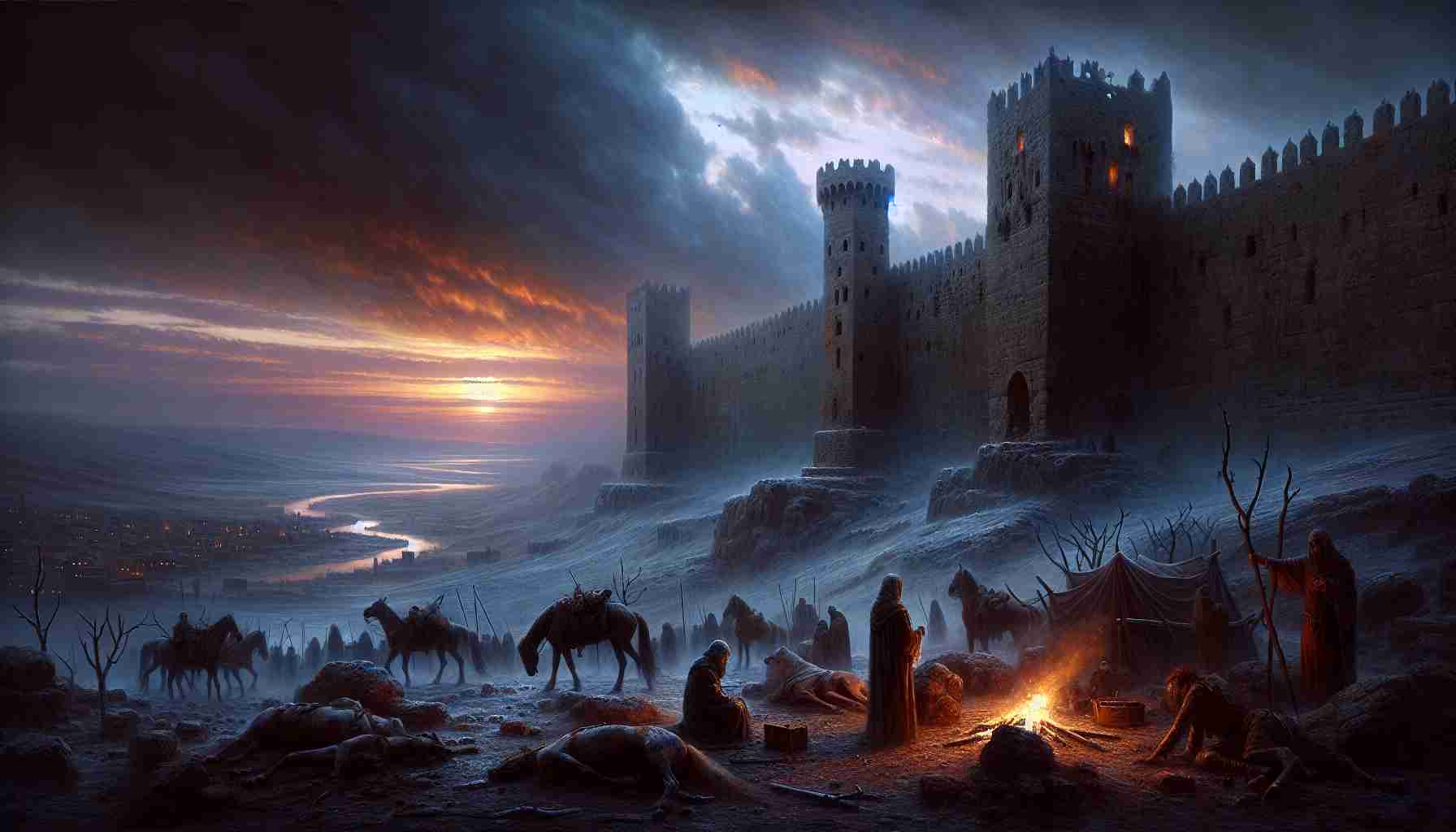

The city walls of Antioch loomed under a pallid sky, their blackened stone stubborn against the hunger and prayer of those outside. Beneath them sprawled filth, corpses, and whispers of deliverance. For eight months, the crusaders had clawed at survival—boiling leather for broth, gnawing on their horses, burying comrades by the moonlight. Every dawn brought hope’s death, and every dusk demanded new faith.
Yet they stayed. Even as dysentery ran with the rivers. Even as Turkish defenders hurled down flaming pitch and taunts. Even when winter iced the Orontes, freezing limbs stiff before morning. Still, the camp knelt. Shivering lips mouthed Psalm 20—“Some trust in chariots, and some in horses, but we trust in the name of the Lord our God.”
Among them stood Raymond of Toulouse, count, pilgrim, and penitent. His fine armor dulled, his flesh hollow. But when he lifted the relic of St. Andrew to the troops, they did not see a noble; they saw a sign. When he prostrated before the relic, they followed suit, mouths stained with ash and bitter snow.
The siege had begun in October of the previous year, 1097. At first, the crusaders advanced with the swagger of destiny, lining their ranks with banners sewn in convents, sewn with tears. But Antioch, jewel of Syria, built by Seleucus and touched by the Apostle Peter himself, would not yield to zeal alone. The city hid within triple walls, towers pulsing with Norman and Armenian blood—the city had danced with empires, and bowed to none easily.
But faith bends stone, and weakness breeds treachery.
Bohemond of Taranto, the cunning southern prince with flame-bright hair and cold-sea eyes, found their miracle in a traitor’s soul. Firuz, an Armenian convert in charge of one of the eastern towers, loathed his Turkish masters more than death, more than gold. One night in early June, he sent word: he would lower a ladder beneath the Tower of the Two Sisters when the lights dimmed.
Bohemond rose the crusader leaders before dark, swearing them to secrecy. That night, as a storm turned the sky to bruise and echo, a company of chosen men climbed the tower’s side like shadowed spiders. Above, Firuz waited, trembling, torn between his God and his betrayal.
They spilled over the ramparts in silence until a single scream cracked the sky. Swords followed. The gates fell. The city lighted with torch and blood.
Every bell in Antioch rang, not for salvation, but for death.
Turkish defenders were butchered in the streets. Civilians rushed to mosques only to find final sanctuary in ash. The crusaders, hungry for food and triumph, let neither muslim nor memory survive. In the citadel, Yaghi-Siyan, the Turkish governor, fled under disguise only to be caught by locals. His head was delivered on a pike the next day.
Antioch had been won—by steel veiled in prayer.
But jubilation soured with the news that a massive Muslim army, led by Kerbogha of Mosul, marched swiftly to retake the stolen jewel. Trapped now inside rather than out, the crusaders turned not to siegecraft but to visions.
In the days that followed, a Provençal soldier named Peter Bartholomew claimed a dream: the Holy Lance, the very spear that had pierced Christ’s side on Calvary (John 19:34), lay buried under the floor of St. Peter’s Cathedral within the city. Exhaustion clouded judgment. Or perhaps it sharpened holy hearing.
They dug for hours. Nothing. Then, struck steel.
He held it aloft as a relic—rusted still, broken perhaps, but nothing could shake their belief. The crusaders marched out with it days later, charging an army five times their strength. Miraculously, or perhaps madly, they won. Kerbogha's alliance fractured mid-battle, and his men scattered before faith forged into fury.
Still, long after the banners flew over Antioch’s towers, questions remained. Was the Lance real, or a forged symbol to stir dying hope? Bartholomew’s later death under ordeal, burned and mutilated, would suggest divine silence.
The city would house the crusaders for months. Bohemond claimed it as his own, though sworn to the pilgrimage to Jerusalem. Many balked, but ambition had found its throne. Feasting filled the halls. Churches were reconsecrated. Yet the stones remembered—blood had soaked into mortar and would not forget.
Psalm 20 sung in victory had not prevented vengeance, nor sanctified slaughter. And yet, many within the Church would take this moment to look again at what faith could demand—and destroy.
Antioch remains, its citadel watching the Orontes like a half-blind sentinel. Fractured towers whisper legends to passing winds. Tourists ask where Peter first preached, where Firuz betrayed, where the Lance was lifted.
And the stones do not answer.
A holy city was won that day. But the cost stitched sorrow beside glory. In the violence of men who trusted in more than chariots—or perhaps far too much in them—came a warning that echoed louder than any triumph: God may use flawed hands, but He judges the heart.
And even the holiest stones still bleed.